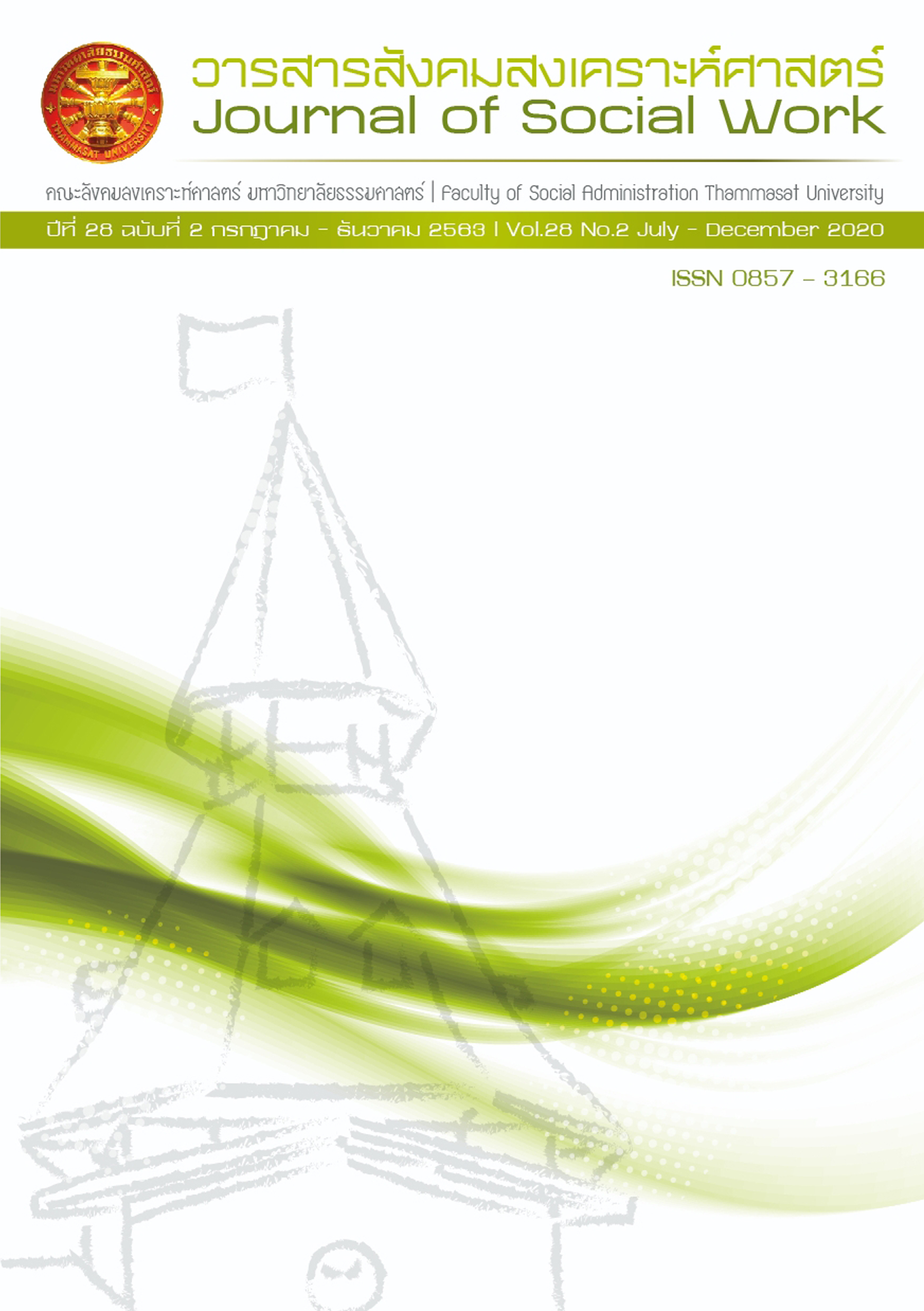Conflict Theory and Critical Paradigm: The Implication for Social Work Practices and Social Work Education
ทฤษฎีความขัดแย้งและกระบวนทัศน์แบบวิพากษ์ : นัยยะต่อการปฏิบัติงานสังคมสงเคราะห์และการเรียนการสอนสังคมสงเคราะห์
Keywords:
Conflict, critical paradigm, social work practices, social work educationAbstract
This article aims to review the concept of conflict theory and critical paradigms that have been influencing on social work practices and social work education. The authors' experiences are critically to comprehend these frames of reference. The social work practicum supervision, the conflict between organizational cultures and universal social work core values, and the Thai youth political demonstration are the examples to reflect the current situation of dilemmas in the social work practical landscape and political arena. Moreover, this article also to propose guidelines based on the critical paradigm and conflict theory for social work practitioners and social work educators to pursue during the conflict period.
References
กิติพัฒน์ นนทปัทมะดุลย์. (2558). การศึกษาระบบอุปถัมภ์กับปัญหาสังคมไทย: การประยุกต์ใช้ของนักสังคมสงเคราะห์วิชาชีพ. วารสารสังคมสงเคราะห์ศาสตร์, 23(1), 178-198.
น้ำผึ้ง มีศิล. (2561). การเรียนรู้เพื่อการเปลี่ยนแปลง: ความท้าทายในการศึกษาสังคมสงเคราะห์. วารสารสังคมภิวัฒน์, 9(2), 54-62.
Abrams, L. S., & Moio, J. A. (2009). Critical race theory and the cultural competence dilemma in social work education. Journal of Social Work Education, 45(2), 245-261.
Applegate, J. S. (2004). Full circle: Returning psychoanalytic theory to social work education. Psychoanalytic Social Work, 11(1), 23-36.
Barlow, C. A., Phelan, A., Hurlock, D., Sawa, R., Rogers, G., & Myrick, F. (2006). Virginia: A story of conflict in social work field education. Affilia, 21(4), 380-390.
Beresford, P., & Croft, S. (2001). ‘Service users’ knowledges and the social construction of social work. Journal of social work, 1(3), 295-316.
Brookfield, S. (1987). Developing critical thinkers: Challenging adults to explore alternative ways of thinking and acting. San Francisco: Jossey-Bass Inc.
Dahrendorf, R., Collins, R., & Further, S. (2006). Conflict and critical theories, Retrieved from https://us.corwin.com/sites/default/ files/upm-binaries/13636_Chapter7.pdf
Daniel, C. A. (2007). Outsiders-within: Critical race theory, graduate education and barriers to professionalization. Journal of Sociology & Social Welfare, 34(1), 25-42.
D’cruz, H., Gillingham, P., & Melendez, S. (2007). Reflexivity, its meanings and relevance for social work: A critical review of the literature. The British Journal of Social Work, 37(1), 73-90.
Fetherston, B., & Kelly, R. (2007). Conflict resolution and transformative pedagogy: A grounded theory research project on learning in higher education. Journal of Transformative Education, 5(3), 262-285.
Fook, J. (2002) Social work: Critical theory and practice. London: Sage.
Fook, J. (2003). Critical social work: The current issues.
Foucault, M. (1977). Discipline and punish: The birth of the prison. London: Penguin.
Freire, P. (1970). The pedagogy of the oppressed. New York: Continuum.
Gibbons, J., & Gray, M. (2004). Critical thinking as integral to social work practice. Journal of teaching in social work, 24(1-2), 19-38.
Mezirow, J., & Associates. (Eds.). (2000). Learning as transformation: Critical perspectives on a theory in progress. San Francisco: Jossey-Bass.
Oberschall, A. (1978). Theories of social conflict. Annual review of sociology, 4(1), 291-315.
Ortiz, L., & Jani, J. (2010). Critical race theory: A transformational model for teaching diversity. Journal of Social Work Education, 46(2), 175-193.
Rome, S. H., & Hoechstetter, S. (2010). Social work and civic engagement: The political participation of professional social workers. Journal of Sociology & Social Welfare, 37(3), 107-129.
Schon, D. (1987). Educating the reflective practitioner. San Francisco: Jossey-Bass.
Stepney, P. (2006). Mission impossible? Critical practice in social work. British Journal of Social Work, 36(8), 1289-1307.
Urdang, E. (1966). An experiment in teaching social work tasks. Social Casework, 47(6), 451–455.
Urdang, E. (2010). Awareness of self-A critical tool. Social Work Education, 29(5), 523-538.
Published
How to Cite
Issue
Section
License
The manuscripts published in the Social Work Journal is the copyright of the Social Work Journal, Thammasat University
Any article or opinion appeared in the Social Work Journal will solely be under the responsibility of the author The Faculty of Social Administration, Thammasat University and the editors do not need to reach in agreement or hold any responsibility.



